#adhd impulsive hyperactive type
Explore tagged Tumblr posts
Text
ADHD Holder Flags 🦋





hiiiiii i made an alt for the existing adhd holder flag (created by @plural-userboxes) with the regular adhd flag colors, and i also made flags for impulsive / hyperactive type, inattentive / distractible type, and two varients for combined type :DDD I made these for pluralpedia btw bc ive been on a kick of reading like every page on that wiki and making flags so XP
during the process of makin these i also made a psd template for system role flags which you can download from google drive :33
#smudglet scribbles#smudglets flags#digital art#photopea#pluralpedia#pride flags#system role#system roles#adhd holder#system role flag#flag psd#flag resource#flag template#adhd#adhd impulsive hyperactive type#adhd inattentive distractible type#adhd combined type#endo friendly#anti syscourse
78 notes
·
View notes
Text
Wild that Eleanor shellstrop got sent to hell for having adhd
#70% of her self improvement in the afterlife is just her relearning executive function now she’s no longer reliant on her dopamine function#I will stand by this#dying is like taking adderall for her#I would also argue mindy st Clare has adhd and that’s why she loves cocaine so much and also impulsively took out her life savings to start#a charity#chidi too actually but he’s got hyperactive type#and it’s mostly internalised#Jason probably has combined type#tahani is autistic but she masks so much she doesn’t realise
8 notes
·
View notes
Text
I'm about to be pedantic about the first chapter of the new story.
I know it's played for laughs, but Chibodee and George being drunk after three beers? When they are specifically the two characters with canonical associations to liquor?
I'm gonna assume that either the peanut gallery is exaggerating how drunk they are, or they threw back the drinks on an empty stomach. (Or I guess that one or both is on a medication that messes with alcohol. Something something don't drink and Ritalin, Chibodee)
#g gundam#thinky thoughts#pardon my implication of ADHD Chibodee#he strikes me as predominantly hyperactive/impulsive type#on that note i also get the ADHD Domon hc I've seen floating around but he's inattentive or combined type#anyway
16 notes
·
View notes
Text
Neurodiversity
Neurodivergence refers to variations in neurological functioning that diverge from what is considered typical or "neurotypical." While there is no single, universally agreed-upon list, neurodivergent disorders generally include conditions that affect cognition, behavior, perception, or social functioning.
1. Autism Spectrum Disorders (ASD)
Autism Spectrum Disorder (ASD)
Pathological Demand Avoidance (PDA) (controversial as a separate diagnosis)
Asperger’s Syndrome (outdated term, now part of ASD)
2. Attention-Deficit/Hyperactivity Disorder (ADHD)
ADHD (Predominantly Inattentive Type)
ADHD (Predominantly Hyperactive-Impulsive Type)
ADHD (Combined Type)
3. Learning Disabilities & Processing Disorders
Dyslexia (difficulty with reading and language processing)
Dyscalculia (difficulty with math and numerical processing)
Dysgraphia (difficulty with writing and fine motor skills)
Auditory Processing Disorder (APD)
Visual Processing Disorder (VPD)
Nonverbal Learning Disability (NVLD)
4. Intellectual Disabilities
Global Developmental Delay
Down Syndrome
Fragile X Syndrome
Williams Syndrome
Prader-Willi Syndrome
5. Communication Disorders
Social (Pragmatic) Communication Disorder
Speech Sound Disorder
Childhood Apraxia of Speech
Selective Mutism
6. Tic Disorders
Tourette Syndrome
Chronic Motor or Vocal Tic Disorder
Provisional Tic Disorder
7. Mental Health Conditions Often Considered Neurodivergent
Schizophrenia Spectrum & Other Psychotic Disorders
Schizophrenia
Schizoaffective Disorder
Schizotypal Personality Disorder
Delusional Disorder
Mood Disorders with Neurological Features
Bipolar Disorder
Major Depressive Disorder (long-term cases cause atrophy in brain regions like the hippocampus)
Dysthymia (Persistent Depressive Disorder)
Anxiety & Related Conditions
Obsessive-Compulsive Disorder (OCD)
Generalized Anxiety Disorder (GAD) (sometimes considered)
Panic Disorder (sometimes considered)
Trauma-Related Disorders (sometimes included)
Post-Traumatic Stress Disorder (PTSD) (when it significantly alters cognition and sensory processing)
Complex PTSD (CPTSD)
Dissociative Disorders
Dissociative Identity Disorder (DID)
Depersonalization/Derealization Disorder
Personality Disorders (Not all PDs)
Borderline Personality Disorder (BPD)
Antisocial Personality Disorder (ASPD)
Narcissistic Personality Disorder (NPD)
Schizotypal Personality Disorder (StPD)
8. Sensory Processing Differences
Sensory Processing Disorder (SPD) (not formally recognized in DSM-5 but widely acknowledged in neurodivergent communities)
9. Epilepsy & Neurological Conditions (sometimes considered)
Epilepsy
Migraines with Aura
Chronic Traumatic Encephalopathy (CTE)
10. Other Conditions Sometimes Considered Neurodivergent
Hyperlexia (advanced reading ability with comprehension difficulties)
Synesthesia (cross-wiring of sensory experiences)
Ehlers-Danlos Syndrome (EDS) (due to high comorbidity with neurodivergence)
Autoimmune Encephalitis (when it affects cognitive function)
Neurodivergence is a broad and evolving concept, with some conditions more widely accepted as neurodivergent than others. The core idea is that neurodivergent individuals experience the world in ways that differ from neurotypical standards, often due to innate neurological differences.
#neurodivergent#neurodiversity#neurodivergence#nd community#personality disorders#antisocial personality disorder#borderline personality disorder#narcissistic personality disorder#schizotypal personality disorder#psychology#mental health#disability pride#autism#adhd#asd#dyslexia#dyscalculia#dysgraphia#auditory processing disorder#apd#visual processing disorder#vpd#nonverbal learning disability#nvld#intellectual disability#developmental disability#down syndrome#fragile x syndrome#williams syndrome#prader-willi syndrome
222 notes
·
View notes
Text
✘ Ticci Toby ✘

General Characterization and headcanons
My general thoughts and characterization of Toby :3
I will DEFINITELY add to this because he is always on my mind and I just know I will think of more stuff, especially the general headcanons

Toby is loud, obnoxious, impulsive, and extreme. Basically, on every scale of anything ever he’s at the far end. He’s uninhibited in just about everything, so he’s not afraid to speak his mind. This also means he has no problem making vulgar comments 24/7. He has no memory of his life before, because Slenderman wiped his memory. “Toby Rogers” no longer exists, and honestly the original Toby would be horrified by the version of himself that exists now. My theory on this is that Slenderman will “amplify” traits that are useful to him when he makes someone a proxy. For example: Toby has ADHD, which would likely make him impulsive and act without thinking. This trait would be amplified once he became a proxy.
Let’s address Toby’s many disorders (also these are constantly getting changed on his wiki page). Let me just say: I have a background in psychology but I am by no means a professional. Nonetheless, here are my thoughts on how these would affect Toby.
Tourette’s and CIPA are both neurological disorders. I feel like a lot of people get the general gist of Tourette’s but I do want to clarify that Tourette’s does not cause a stutter. I know a lot of people write Toby having a stutter, and I think it’s become a headcanon itself at this point, but this would not be due to Tourette’s. I keep it pretty simple when it write his tics, just a few motor and verbal tics, like cracking his neck or cursing. CIPA stands for Congenital Insensitivity to Pain with Anhidrosis. Basically, this disorder causes him to not be able to feel pain or temperature (which makes sense because both of these are conveyed on the same spinal tract). He also can’t sweat, because if you can’t feel temperature then your body doesn’t know when to produce sweat. Realistically, people with this disorder have a lot of issues with living daily life, mostly due to overheating since they can’t regulate their body temperature. Most people with CIPA do not live past age 25, but he’s a fictional character so we’ll let it go.
ADHD is a neurodevelopmental disorder, and there is more than one type. Based on his behavior I’d guess Toby either has combination type or hyperactive type. He’s impulsive, easily distracted, and at times it can be hard to keep him focused. He will sometimes interrupt during conversations or speak at times when it’s not appropriate.
Amnesia is also listed which is Slenderman induced. Based off his original story, I would argue that the schizophrenia is also Slenderman induced. Nonetheless, I think his main symptoms would be hallucinations (so hearing voices) and disorganized speech. Basically, you’d ask him a question and he just would talk on and not really answer the question (Google patient interviews for Schizophrenia if you’re confused by what I mean by this). I also think Toby would be subject to delusions, mostly to do with illusions of grandeur or paranoia.
Toby also has bipolar disorder, though it’s not specified whether he has type one or type two. Honestly, this is where I have a qualm which is that I think instead of saying he has schizophrenia and bipolar disorder, it should just say he has schizoaffective disorder, bipolar type. But I DIGRESS!
I think Toby would be silly goofy to be around. He’s super uninhibited and speaks his mind. He’s always full of energy. He can be a lot to handle at time and he doesn’t often listen to reason. You could definitely get into some shenanigans with him.
I think it’s easy to interact with him, he’ll talk to pretty much anyone and act friendly with them, but it’s a whole other ballpark trying to get close to him. It would take extensive amount of time, and would have less to do with your behavior and more with you just pinging in his brain in just the right way to make him want to invest more into you.
My thoughts on Toby are never ending, and I’ll probably continue to update this post when I think of new things. However let me say this: this man is not medicated for ANY of these issues so they would all be present in some capacity if you interacted with Toby.
Random headcanons
✘Toby is like 6’1-6’2 (yes I know he was originally short let me live) and he’s somewhat lanky but he’s got that sleeper build
✘ TOBY SMELLS LIKE PINE AND CEDAR AND LIKE THE LOVE OF MY LIFE
✘ has snakebite piercings (meow)
✘ speaks German
✘ I like to think he’s second gen, like his parents were immigrants and thus he speaks German and English
✘ Toby, I need to know where ur grandparents were from 1939-1945
✘ lowkey would use his Tourette’s to get away with everything
✘ like would defo punch Jeff in the face and then be like “aw shit man sorry that was my Tourette’s”
✘ would also use it to get away with saying crazy bullshit
✘ covered in scars cuz CIPA
✘ Toby likes to go fishing and catch them with his BARE HANDS
✘ he can only be in the car if he’s the one driving, it really bugs him if he’s not in control of the car…. Though he doesn’t know why
✘ says crazy out of pocket bullshit 87% of the time
✘ but it would be funny as hell though
✘ like it would be the type of stuff where you know you shouldn’t laugh and you try to avoid laughing in front of him because you know it’ll make him do it more

199 notes
·
View notes
Note
Hello, I saw your post about a yandere Benjamin Lemberk with an elf. It occurred to me if he could be the same yandere Benjamin Lemberk x reader with the appearance of Florentia Lombardi and a personality between Helaena and Gael Targaryen is autistic with ADHD and sensitive please
(Warnings: reader is mentioned to have a mix of ginger hair with a mix of reader's original colour and heterochromia with one green-coloured eye and one has your eye colour ||Florentia Lombardi! reader.
PLEASE forgive me for not getting things right..I'm a pretty neurotypical person and I have no idea what I'm doing. Tried to make it from whatever information I got from google. 2nd Warnings: non acceptance of mental illness, ableism, murder, mutilation, everything bad except SA and cannibalism, we don't do that. Keep in mind, I don't condone this and you're very much valid, Benji here is just an asshole, too much of a douche, sorry.. Again, sorry for any inaccuracies or anything, I got everything off of google)
© Writing belongs to me, Lxdymoon0357. Do not plagiarize, but reblogging, liking and commenting is deeply appreciated.

Yandere!Benjamin Lemberk HCs

◈ The moment Benjamin fell out of Claudia's circle, his eyes were left onto you. An eccentric, soft-spoken, hyperactive, restless little elf. Of-course in no way was he going to let you go. You're just the cutest thing ever!!♡
◈ He does find it a bit irritating how you hyperfixate on certain things, especially bugs and other things, can't you see he's doing things and going out of his way for you? He doesn't care if your autism or ADHD is the cause of it, stop being selfish!
◈ But depending on how much you behave regarding him, he finds you soft-spoken behavior appealing though he would have preferred you being a bit more like Claudia; bright and out-spoken.
◈ but your soft spoken and cryptic language speaking and non society conforming behavior, hyperattentive traits, stimming and all of it bothers people, so he's somewhat okay with it as long as people don't get too close, he doesn't want to kill as many people. Too much work in his eyes, but as long as it's for you, he'll do whatever you want!~
◈ He'll always be beside you if he can't keep you locked away forever, help you with societal cues and everything and kp your hyperactivities are bay, but not really, he doesn't really care if you end up annoying people away. I mean, it's only working in his favor.
◈ Always listens to you talk about your bug collection or new hyper-interest in whatever you have, the weird way of systemization and your intense routine you seem intent on following. God, you're so hot when you blabber about stupid things no one seems to care about to intensely!~
◈ But he does feel like you're going half-insane when you start speaking in cryptic language, your eyes may be pretty..but he can only sit so much before he feels like you're cursing him with your cryptic language, please.
◈ But you're not just some timid girl, your firmness and you do put him in his place, despite your soft-spoken, reclusive and sensitive, eccentric traits. You do have firmness and manners of authority in yourself. He does stop being so shitty to you and behaves better regarding your mental health.
◈ His jealousy issues are off the charts, keeps you locked up everyday..but in a way he lets you hyperfixate on all interests and burn out all hyperattentivity, impulsivity and keeps you so occupied your lack of attention on certain things and time blindness doesn't really matter.
◈ Lets you use his fingers for stimming or his clothes, he gets jealous of everything and anything.His clothes are very fancy, but sometimes too over-stimulating with heavy perfumes, rough textures and evn the way it can sometimes snatch on your own clothes with it's jewels and all..So there's that.
◈ But speaking of his clothes, you may get easily overstimulated by his clothes and sometimes even his presence, the fucker is very much in himself a asmr video of type. You may even end up maybe crying and he has to control the urge to really just burn his clothes right then and there so you would stop crying. He may be the biggest, ableist and even deny you your mental health..but the moment your mental health does affect you, he'll be dying to get it fixed. He may be an asshole, but he's only your asshole.
◈ But in a way, he also uses your mental health against you. Using anything that overstimulates you for keeping you chained down, though it doesn't work like magic..but you're more subservient when he does use anything that you get overstimulated by; heavy perfumes, weird textures, nothing to stim with, tight closed rooms, even if keeping your own hair down overstimulates you, he'll force you to not put it up in hairstyles, till you can behave atleast.
◈ One time he got into this dilemma with you where he came home to you with your autism and adhd battling against each other. Apparently you were trying to 'arrange' numbers (because everything you do is universally correct), but very time you did come around, your attention never stayed and you moved on. So you removed all distractions and started to again 'arrange' numbers correctly. But again, attention never stayed so you only sat there with nothing, you wouldn't move and wer adamant.
◈ He had never thought in his life that one day, he'd have to sit down with love of his life and the bane of existence to 'arrange' numbers by their 'correct' order because you wouldn't move otherwise and literally. It took seven hours because you two kept getting distracted by your conversations to 'arrange' around a hundred numbers from 0-100. He hopes you don't get the idea of 'arranging' numbers again for 0-1000 or something because their feeligns hurt they wer left out or something.
◈ But leaving that..If anyone, other than him at-least, dares to comment on your mental health in a way you don't like like babying you or refusing to acknowledge it's something you struggle with or literally ANYTHING he does, but it's someone else. He has a whole procedure; first he'll kidnap them, torture them to get apologies so loud, you can hear it from your own room in his manor and then once he's satisfied, he'll kill the person off..but not before mutilating and really using them as a dart board or disfiguring their faces to the point of non recognition of their corpse.
◈ Yeah, it's a lot being with him with mental illness and soft spoken and eccentricness. Him as a yandere is even worse than him with Claudia, which is already borderline yandere.

#navi⌗writes⌗#navi⌗answers⌗!!!!!#i became the hero's rival#i became the hero's rival x reader#benjamin lemberk x reader#benjamin lemberk x you#benjamin lamberk x y/n#benjamin lemberk x y/n#i became the hero's rival x you#i became the hero's rival x y/n#manhwa smut#manhwa x y/n#manhwa x reader#manhwa x you#manhwa imagines#manhwa scenarios#manhwa drabbles#manhwa fic#manhwa fanfic#manhwa fanfiction#x reader#reader insert#x you#fem reader#yandere manhwa x reader#yandere character#yandere manhwa#yandere benjamin lemberk x reader#yandere benjamin lemberk x you#yandere benjamin lemberk
292 notes
·
View notes
Text
Disabled Characters in Reverse: 1999 - Part 3
Welcome to the final installment of this list of the game's disabled characters (for now), and we are ending it with the most interesting of them: the neurodivergent characters!
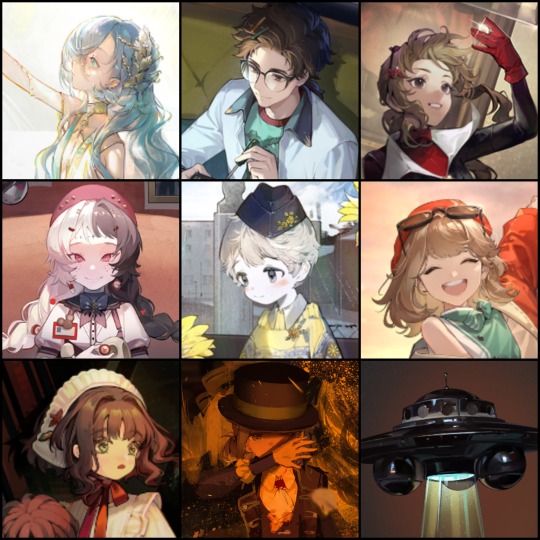
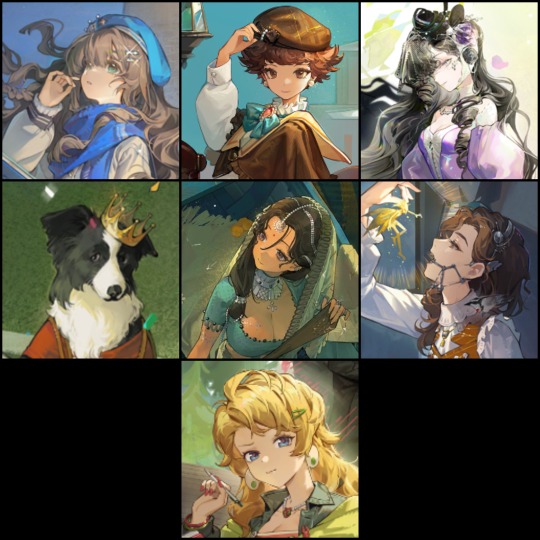
These characters are particularly special since a lot of them are mainly speculated, but they draw heavy parallels to their respective conditions that they had to be taken note of.
Now because there are so many characters, they became an entire category of their own instead of being lumped with the previous post, and this became undoubtedly one of the longest texts I've written down among most of the analysis posts I've made for this game.
I hope that you enjoy reading this final piece, let's get started.
Autism: 37, Horropedia, Melania, Balloon Party, Avgust
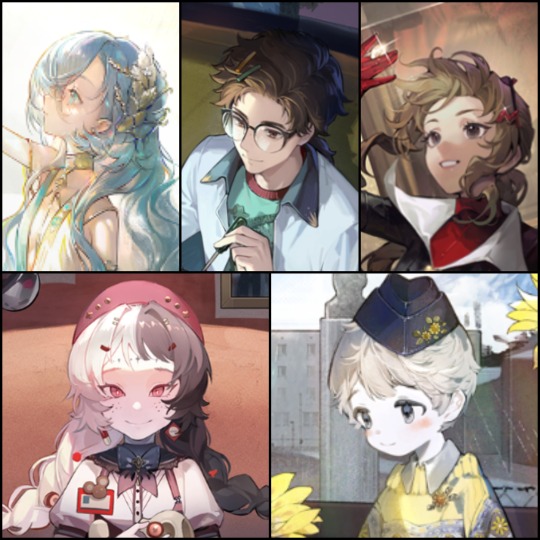
All of these characters are incredibly similar to each other, and yet they all have their share differences. For example, both Horropedia and 37 are characters that embody one of the main stereotypes about autism: Incredibly intelligent characters who fixate on specific subjects. 37’s focus is on mathematics, while Horropedia’s is the horror genre. Even their personalities are quite similar: arrogant yet kind and understanding people.
They lace their speech with associations to their topic of interest, and will infodump about it unprompted. The two of them also struggle to pick up social cues, nor can tell if the information they’re sharing is unsolicited because the information is normal to themselves.
However, the difference between them in this is that Horropedia is more carefree about it, whilst 37 is more self-aware about the fact that she can’t come to a mutual understanding with others.
The rest of the characters here also share these traits, but they all stand out in their own ways:
Melania’s intricate way of making plans tends to be in the form of academic exams. These tend to be her greatest motivator when it comes to doing work, and gets easily frustrated when having to change them. She also has a set routine that she gets easily surprised by sudden interruptions.
Balloon Party’s speech is found to be unconventional (i.e. the speech impediment from earlier, the tone of her voice is found to be naturally flat) and is paired with word association and echolalia.
Avgust has a unique understanding of the world around him, with him associating everything and everyone with more innocent concepts. (e.g. his father’s death is often referred to as him “sleeping in the mines”) None of these mean that he doesn’t understand things like death as what they are, only that he’s very young among the cast and has been raised in a healthy environment that allows him to continue thinking this way for a bit longer.
ADHD: Regulus & Eagle
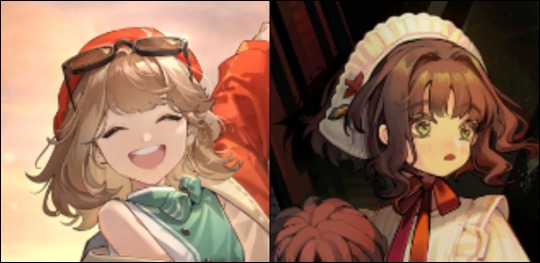
With Regulus, it’s more of a headcanon than it is backed by evidence, but the main points that can be found for her are her restlessness, lacking attention span, and her impulsivity. They’re common aspects (hyperactive) in ADHD, and thus they aren’t exactly conclusive.
But I also found that Regulus also tends to bring her interests to light when navigating through conversations, and this with the reasons mentioned above makes me personally believe that Regulus does not just strictly have ADHD, but still overall neurodivergent.
Eagle seems to have the inattentive type of ADHD. A more established indicator of her likely having it is through her anecdote, where she was said to have had some sort of attention-deficit. In that anecdote, Eagle mainly acts on her own impulses such as jumping to try to find the missing boy scout, and even helping X if it meant that it progressed her mission.
She struggles to take rejection and constantly tries to prove herself to be able to gain the acceptance she’s looking for. It made me believe that she has Rejection Sensitivity Dysphoria. (RSD)
While these alone aren’t conclusive either, they still give me enough reason to believe that Eagle could be implied to be neurodivergent too.
AuDHD (Autism + ADHD): Vertin, Marcus, AliEn T
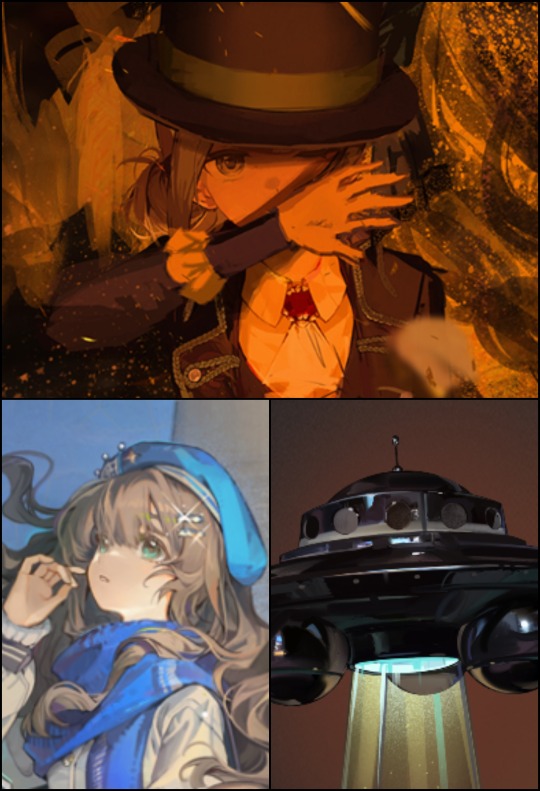
From the earlier points, we find that some of the mixed traits that make for auDHD are found in Vertin, Marcus, and AliEn T. All three of them are quite emotional (even Vertin in spite of her stoicism) and impulsive people, where they tend to jump into action when they have a rough plan set in mind. They also have their own interests (wildlife, reading, Earth) and tend to get absorbed into their own thoughts quite often. Because of the latter, they tend to lead themselves into executive dysfunction. Some things about them differ, however.
Starting with Vertin, most of the “obvious” signs are present in her childhood, where she was restless and curious of the world beyond SPDM, making it difficult for her to focus in school. Yet, she still kept up with topics that interested her, going as far as skipping classes to learn in her own way.
She has gotten punished often for her “defiance,” and ended up being radicalized by it and by the trauma she faced in Chapter 3. Currently, she masks quite heavily to a degree, leaving her main indicators to be her tactile tendencies (i.e. touching things and others out of curiosity) and her becoming absorbed to her own thoughts.
Meanwhile, Marcus is an incredibly anxious person. She often relied on someone like Hofmann to socialize with others and make decisions for her since she struggled greatly in that aspect. She can be easily upset by things and even by her own overthinking, taking rejection quite poorly before resorting to immediately coming up with ways to resolve it.
She often retreats back to reading to be able to ground herself from any stress. But now with everything that’s happened, Marcus has begun working on herself and mustering the courage to be able to push her limits independently.
We’re not entirely sure about how AliEn T’s home society is structured, but it can be argued that his and our societies tend to parallel each other. For example, AliEn T is seen as a bit eccentric to his kind like the regional manager and co-workers because of him being emotionally prone and being very fixated on the Earth. (which his society collectively avoids)
A lot of his notes about his home in the anecdote imply that in his home society, they have their equivalent of some of the struggles found in the neurodivergent experience, which is why he and Officer Williams in the anecdote could empathize with each other.
Others / Related but non-diagnostic: Mesmer Jr., Isolde, Pickles, Kaalaa Baunaa, Tooth Fairy, Blonney
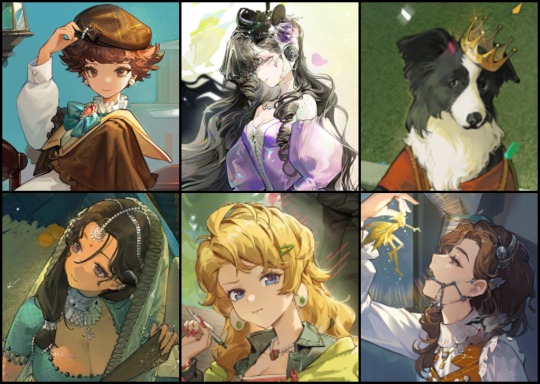
As I explained in the previous post, Mesmer Jr. and Isolde both greatly suffer from conditions that particularly stem from their trauma and subsequent C-PTSD.
Again, Mesmer Jr. is heavily hinted to have OCD, while Isolde has many disorders linked to C-PTSD. (formerly named as "hysteria") Due to the nature of their respective conditions, they both deserve a place here in this list.
It can be assumed that Pickles is neurodivergent due to him being nicknamed as an “indigo pup.” While this might be related to his arcane skill, the nickname is also intriguing because it's like the term “indigo children.”
“Indigo children” are classified as those who are incredibly intelligent and possess special talents or powers according to the New Age concept. However, this classification is closely associated with neurodivergence due to the similar descriptions.
Meanwhile, Kaalaa Baunaa, Tooth Fairy, and Blonney have shared stories in which they've had to maintain some form of distance towards their arcanist identities due to the hostile nature of their environments. They embraced it as part of themselves in the end, though.
Kaalaa Baunaa has been an avid researcher ever since she was young, and enjoys maintaining punctuality through routines. However, she had been often discriminated against in her initial workplace, where her arcanist identity had been picked out first before taking her research in consideration; even her research had been disregarded due to the “unconventional” methods that she applied to conduct them.
It can be considered a familiar feeling among neurodivergent people and it is incredibly frustrating when it happens. For KB, it had gotten bad to the point of her (and Kumar) getting kicked out of their institution, but it never stopped either of them from continuing to do their work.
Tooth Fairy and Blonney both grew up in mixed societies, where they had to force themselves to conform to be able to be accepted in both human and arcanist social spaces.
Tooth Fairy, while achieving this balance in her college years, had never been treated as an equal by either side due to both her arcanist identity and frequency to interact with humans. She was bullied for it and was even taken advantage of when she made the medicine in her character story. These experiences led her to accept her own identity and eventually stop overtly conforming to both societies.
Blonney meanwhile moved to a predominantly human society, where she greatly conformed to human ideals and trends to “fit in” with the humans. But she was still off-handedly discriminated against due to simply just being an arcanist. She tried really hard to suppress herself, to the point that she dimmed her own “light” and was unable to use her personalized arcane skill. But when she came back to Green Lake, her mask slowly fell apart, and then it reignited her passion, which allowed her to begin accepting herself again.
Honorable Mentions
Sonetto, Matilda, Sotheby, Ezra, Jessica - Autism (mainly credited from: @/H0LOdm on twt)
While these are mainly headcanon, some of these characters here do display neurodivergent traits in their own ways, most especially the latter 3 of these characters here. They all struggle to pick up social cues and tend to struggle in (conventionally) socializing/empathizing with others.
Sotheby and Jessica in particular both lace their language using their interests and the environment they grew up in. Ezra also uses his interests in fungi as a conversation starter with others, eager to see any mushrooms that might be potentially found anywhere.
Final Notes and Thanks
When I started writing these down I didn't really think much of it outside of the fact that there were so many characters who were particularly neurodivergent, which then further extended to the rest of the disabled characters as well. I tried my best to word these as respectfully as I can, and that I hope people could find fun in reading these as much as I did writing them.
I give my acknowledgements to these people for their help and support for the creation of list in entirety: Jager, Lupjo, Reg, Bee ( @e-0timely ) , Abyss ( @abyss-idiot ), and Tokki
Considering the nature of this list, I want to say that are non-conclusive and can be interpreted in any way you want. As I said in my previous version of this post, "...Every experience is different, and I think these characters here openly show that."
Feel free to add your own insights, corrections, and even your own headcanons here. Thanks for reading, and have the two links to the first two lists down here.
Physically Disabled Characters Psychologically Disabled Characters
#reverse 1999#character analysis#horropedia#avgust#vertin#balloon party#kaalaa baunaa#tooth fairy#37 reverse 1999#melania reverse 1999#regulus reverse 1999#eagle reverse 1999#alien t reverse 1999#marcus reverse 1999#pickles reverse 1999#blonney reverse 1999
213 notes
·
View notes
Text
✨ Morally Colour-Coded Characters + Neurodivergence & Personality Traits 🧠
Hogwarts Legacy Edition ��
* DISCLAIMER: This analysis isn’t meant to be an absolute truth, but rather a personal and SPECULATIVE interpretation of these characters. You’re welcome to share your own perspective too! ❤️
🩶 MORALLY GREY: Sebastian Sallow

Driven by devotion and desperation, ruined by impulse.
Deeply compassionate and empathetic at heart, but his inability to regulate his impulses and accept limits make him dangerous.
He unconditionally protects those he loves (especially Anne), even if it means defying every rule, law, or moral boundary.
🧠 Sebastian's Neurodivergent & Personality SPECULATIVE profiles:
- ADHD (Attention-Deficit/Hyperactivity Disorder), but predominantly Hyperactive-Impulsive type: his restless energy is reflected in his quick mood swings and impulsive tendency to act without full consideration, especially during confrontations or tense situations. His hyperactivity isn’t only physical but mental as well: he’s constantly thinking, researching, and driven by an insatiable curiosity, especially about the Dark Arts and forbidden knowledge. This impulsivity also affects his relationships: when overwhelmed or frustrated, he sometimes dismisses his best friend Ominis and his advice, and places conditional trust in MC, revealing dangerous secrets and teaching unforgivable spells because he needs MC's help to pursue his own goal, a cure for his sister Anne (however, by the end of his quest, this utilitarian mindset shifts into genuine appreciation and respect).
These behavioural patterns are commonly associated with ADHD. Due to reduced sensitivity or availability of dopamine receptors in certain brain areas, he tends to seek novelty and intensity as a form of compensation, often manifested as impulsive decisions, risk-taking, and nonstop mental activity.
- CPTSD (Complex Post-Traumatic Stress Disorder) features: rooted in his traumatic family background and personal losses. Also, the curse affecting his sister Anne fuels his deep-seated and sometimes irrational hatred towards the goblins he believes responsible. This trauma might manifest in intense emotional reactions, guardedness, and difficulties fully trusting others.
- Mild Oppositional Defiant traits: occasionally resists authority or social expectations.
- Giftedness?: demonstrates strong magical aptitude, intellectual curiosity and problem-solving skills.
Fandom whisper: “He’s a red flag you’d proudly wave at the Quidditch Cup”
🟢 MORALLY GREEN: Ominis Gaunt (to me, he’s the most psychologically complex character, so grab a drink, this is going to be a long one)

On the surface, he is polite and composed, but beneath that lies a fierce moral conviction, deep compassion, and the quiet courage to stand firm for what’s right and against violence and dark paths. He's determined to break free from his toxic legacy and refuses to become like them.
His introversion is a shield, but also a prison. Blindness isn’t just a physical limitation, he fears his own helplessness, his limits, and how easily he could be manipulated when left behind by the ones he truly loves.
🧠 Ominis' Neurodivergent & Personality SPECULATIVE profiles:
- *ASD (Autism Spectrum Disorder, Level 1) ❤️: he presents a strong attachment to a strict moral code and routines. His communication style is direct and serious, he rarely engages in sarcasm or jokes. He reacts with visible anxiety to unexpected changes or tense situations, often accompanied by repetitive self-soothing body language. Some of his behaviours (like sitting alone on the floor in a busy area deeply absorbed in his thoughts) might be perceived by others as disruptive or socially atypical.
But despite his rigid mindset, he’s not emotionally invulnerable. He also shows signs of emotional shutdown under relational pressure. When it comes to his best friend Sebastian, all that structure collapses, choosing emotional self-preservation (connection) over his values and principles (conviction), e.g., when he allows MC to cast Imperius on him to avoid damaging his bond with his best friend, or when he breaks down crying over the decision to turn Sebastian in or not... he’d rather lose control than lose Sebastian (did you notice Ominis’ face during the end-of-year ceremony when you choose to turn in Sebastian? The sadness in his expression makes the whole scene truly devastating).
* While some behaviours could also be linked to childhood trauma (CPTSD), the consistency and subtle rigidity in his responses (along with self-soothing actions, deep moral conviction, sharp emotional intuition, difficulty with social flexibility and emotional shutdown under pressure) hint to me at possible neurodivergence as well (ASD).
- CPTSD (Complex Post-Traumatic Stress Disorder): including symptoms such as emotional dysregulation, hypervigilance, difficulties trusting others and problematic attachment patterns with his elitist family due to a childhood marked by coercion and fear tied to dark magic and an obsessive belief in blood purity) 😭
- GAD? (Generalized Anxiety Disorder): some body language signs during the Scriptorium quest: he paced nervously in circles, eyes glued to the floor. Though he can’t make accurate eye contact because he’s blind, he usually turns his face toward whoever is speaking. However, when he lost control at the Scriptorium door, he didn’t focus on anyone. He kept bringing his hands near his mouth and nose throughout the quest, fidgeting with his fingers in a self-soothing gesture. His voice cracked as he begged them to stop, visibly distressed and in rising panic.
Fandom whisper: “He’s a cinnamon roll, yes… unless you're Duncan. Then, run. He’s entering berserker mode”
🔴 MORALLY RED: Ranrok

He presents himself as justice for the oppressed (vengeance masked as revolution), but his true drive is fuelled by hatred, bent on domination and destruction. He is the very definition of "the ends justify the means".
🧠 Ranrok's Neurodivergent & Personality SPECULATIVE profiles:
- ASPD (Antisocial Personality Disorder): a trauma-driven sociopath with psychopathic traits.
- Paranoid Delusional traits.
- Complex Trauma Response (identity-based).
Fandom whisper: “He had a point... until he started incinerating everyone”
🔵 MORALLY BLUE: Solomon Sallow

He is the tragic disciplinarian, a man who outwardly upholds order, sacrifice, and tough love. Beneath he does care deeply, but his affection is buried under control disguised as protection. He relies on cold rationalism and mistakes emotional distance for maturity.
Rebellion (especially from Sebastian), isn’t seen as a cry for help, but as a threat to the fragile order he clings to.
🧠 Solomon's Neurodivergent & Personality SPECULATIVE profiles:
- OCPD (Obsessive-Compulsive Personality Disorder).
- CPTSD? (Complex Post-Traumatic Stress Disorder).
Fandom whisper: “He gave up on the cure but became another symptom”
🟣 MORALLY PURPLE (deluxe): Phineas Nigellus Black

His surface morality is conservative and defined by complex loyalty. He is a cunning strategist who carefully navigates social and political webs with subtlety and precision.
Beneath this façade lies his true morality: driven by self-interest and elegant manipulation, he never dirties his own hands. His ruthless pragmatism means his decisions are cold and calculated when necessary. Arrogant and elitist, Phineas is too proud to care about anything outside his own priorities. He values bloodline and power far above personal relationships or moral ideals.
He embodies the grey areas between loyalty, self-interest and pride (a man who probably polishes his Slytherin badge daily). His sharp remarks may sound cruel, but they come from a desire to assert control rather than a need to hurt (manipulative, yes, but not cruel for the sake of it).
🧠 Phineas' Neurodivergent & Personality SPECULATIVE profiles:
- NPD (Narcissistic Personality Disorder).
- Giftedness with Social Detachment (non-clinical trait).
- Mild Machiavellianism? (strategic manipulation, not cruelty).
Fandom whisper: “No need to raise his voice, only his eyebrow. Evil, a misunderstood genius or just insufferable?”
🟡 MORALLY YELLOW: Duncan

He’s cautious and self-protective, often avoiding confrontation or risky situations. He tends to stay in the background and prefers others (like MC) to take the lead or face challenges, while he seeks approval to cope with his insecurities and fear of being singled out. He never takes risks and opts to stay uninvolved, seeking validation from others to compensate for his lack of self-worth, partly driven by fear and insecurity.
Introverted and socially awkward, Duncan experiences bullying and exclusion, which makes him hesitant to assert himself or confront others directly.
🧠 Duncan's Neurodivergent & Personality SPECULATIVE profiles:
- SAD (Social Anxiety Disorder): evident in his intense fear of social situations and tendency to avoid attention or judgment from others.
- Specific Phobia (puffskeins): irrational fear of puffskeins after a traumatic incident where one stuck its tongue up his nose. He has been unable to overcome despite efforts from friends like Poppy.
- ASD? (Autism Spectrum Disorder, Level 1): more evident in his social reservation and avoidance than in sensory or communication issues.
Fandom whisper: “Wants to be remembered. Not involved... just remembered. Not a villain. Not a hero. Just… there”
🩷 MORALLY PINK: Garreth Weasley

Pink, but only after 3 butterbeers and a terrible idea (don’t trust his decisions -or his potion skills- after drink #2).
🧠 Garreth's Neurodivergent & Personality SPECULATIVE profiles:
- ADHD (Attention-Deficit/Hyperactivity Disorder), Combined type.
- Risk-Seeking behaviour (non-pathological).
- Mild Oppositional Defiant traits (playful, not hostile).
(Sorry, I’m just too drained right now, so I’m leaving Garreth to you 😉).
#hogwarts legacy#sebastian sallow#ominis gaunt#ominis#phineas nigellus black#ranrok#solomon sallow#garreth weasley#colors#morally gray#morals#personality#neurodiversity#neurodivergent#adhd#autism
113 notes
·
View notes
Text
Mapping Neurodivergence in BSD: A Headcanon Exploration
💭✨ Neurodivergence has always been one of my biggest special interests, and something I love about fiction is how much space it gives for different interpretations.
Bungou Stray Dogs is accidentally one of the most neurodivergent-coded series I’ve ever seen—whether it’s intentional or not, so many of the characters just feel ND in ways that go beyond typical genius or eccentricity tropes.
Whether it’s Ranpo’s hyperfixation on mysteries, Kunikida’s compulsive need for structure, or Chuuya’s impulsive emotional outbursts, these characters reflect real-world neurodivergent traits in ways that are compelling, complex, and painfully relatable.
This list is a collection of personal headcanons based on their behaviors, interactions, and underlying motivations.
✨ I'll be doing deep dives into each character here, analysing their traits in more detail! (Of course, this is all just for fun! Everyone interprets characters differently, and that’s part of the beauty of fandom. 🖤)
🕵️♂️ Armed Detective Agency
Osamu Dazai – Autism (Masking & Situational Manipulation)
🔹 Highly intelligent but emotionally disconnected in ways that seem intentional. 🔹 Uses humor, dramatics, and exaggerated behavior as a social mask. 🔹 Deeply perceptive of people’s emotions but doesn’t always engage genuinely. 🔹 Alternates between hyperfixation (on suicide, on outplaying opponents) and emotional dissociation. 🔹 Sensory-seeking behaviors (bandages, physical playfulness when teasing others).
Edogawa Ranpo – Autism (Hyperlexia, Special Interests, & Social Processing Differences)
🔹 Hyperlexia: Genius-level reading comprehension and information processing from an early age. 🔹 Doesn’t understand or care for social norms—he thrives best when people adapt to him, not the other way around. 🔹 Fukuzawa accommodating his intelligence and treating him with respect instead of condescension was a turning point in his life. 🔹 Low frustration tolerance for perceived incompetence but deeply loyal to those he trusts. 🔹 Sensory & executive dysfunction struggles? Can’t dress himself properly, avoids certain textures (like food).
Doppo Kunikida – OCD (Perfectionism, Order, & Intrusive Thoughts)
🔹 Highly structured routines—his notebook is more than a quirk, it’s a lifeline. 🔹 Ritualistic behavior: Needs things to go exactly as planned or he experiences distress. 🔹 Moral rigidity: Struggles when ideals don’t align with reality, leading to internal conflict. 🔹 Likely experiences intrusive thoughts—his strong reactions to things outside of his control seem rooted in anxiety.
Atsushi Nakajima – Rejection Sensitivity Dysphoria (RSD) & PTSD
🔹 Hyperaware of how others perceive him, even in neutral situations. 🔹 Intense fear of failure, especially when it might lead to abandonment. 🔹 Struggles with self-worth due to past abuse, leading to cycles of self-doubt.
Yosano Akiko – PTSD & Possible Hyper-Empathy
🔹 Deep emotional trauma from her past but keeps it buried under a tough exterior. 🔹 Uses dark humor as a coping mechanism. 🔹 Highly attuned to others' suffering despite her cold demeanor.
⚡ Port Mafia
Chuuya Nakahara – ADHD (Hyperactive-Impulsive Type) & RSD
🔹 Impulsive emotional reactions—anger, excitement, frustration, all at max volume. 🔹 Struggles with authority but is also fiercely loyal when trust is earned. 🔹 Hyperfixation on proving himself, especially post-Dazai. 🔹 Likely has rejection sensitivity dysphoria (RSD), leading to intense emotional reactions when he feels slighted.
Akutagawa Ryunosuke – Autism (Demand Avoidance) & CPTSD
🔹 Blunt, socially unfiltered, and struggles with nuance—his reactions are either extreme aggression or complete silence. 🔹 Sensory hypersensitivity (his strong aversion to being touched). 🔹 Struggles with emotional regulation—anger is his default reaction because other emotions are too vulnerable. 🔹 Demand Avoidance: Will resist authority figures unless they earn his respect.
📖 Other Figures
Edgar Allan Poe – Social Anxiety & Autism (Special Interests & Sensory Sensitivity)
🔹 Hyperfixation on gothic literature and storytelling. 🔹 Difficulty with in-person social interaction, preferring structured, written communication. 🔹 Likely hypersensitive to noise and prefers solitude.
✨ Which headcanons do you agree with? These are just my personal interpretations! Neurodivergence is super broad, and while I love diving into ND traits in characters, it’s totally cool if you see them differently. This is all for fun, so feel free to share your thoughts!
💡 I’m also open to requests! If there’s a character you’d like me to explore more deeply, or if you think I missed someone, feel free to drop an ask or comment. I’d love to hear your thoughts and keep building this list together!
#BungouStrayDogs#bsd headcanons#Neurodivergence#BSD#NeurodivergentCharacters#Headcanons#chuuya nakahara#dazai osamu#ranpo edogawa#kunikida doppo#atsushi nakajima#yosano akiko#akutagawa ryuunosuke#edgar allan poe#bsd analysis#Loulitzin Does HC's: BSD#Loulitzin Rambles: BSD
81 notes
·
View notes
Note
I have combined ADHD, but in a fanfic I'm writing I want to write my OC who has inattentive ADHD. how exactly would I go about doing that? asking bc I'd assume it'd be a different experience than mine, since they have a different type and all ty for any input!
Hi asker,
People with primarily-inattentive ADHD (ADHD-PI) are more bound to have 'internal' symptoms than external symptoms.
What I mean by this is that someone with ADHD-PH (primarily hyperactive) is more likely to be visibly restless or fidgety, talk too much, have issues staying seated or in one place, or make impulsive decisions. Someone with ADHD-PI is more likely to have trouble paying attention to details, seem like they're 'in their own world' when they're supposed to be paying attention, lose things, have trouble finishing tasks, and get distracted by external stimuli. (And someone with ADHD-C, combined, will consistently struggle with all of the above.)
This doesn't mean that people with PI never struggle with hyperactivity or vice-versa, just that the majority of their symptoms will lie in either inattention or external hyperactivity. That's why it's called "primarily inattentive" or "primarily hyperactive," not exclusively. (This is the case in both the DSM-5 and the ICD-11. The ICD-10 is a little trickier because it uses a different name entirely for ADHD.) It's possible that inattention is caused by internal hyperactivity; but I'm not an expert and my ADHD is combined so I get all of the above.
You can still draw on your experiences because you are bound to have a more similar experience with someone with ADHD-PI than to someone without ADHD entirely.
Depending on what you're writing, the focus on the symptoms will be different -- for example, in a school or work setting, ADHD is going to have different struggles than in, say, a superhero setting or a dystopian setting. But focusing on attention-managing symptoms and working-memory related symptoms will probably help you write your character.
Hope this helps,
mod sparrow
57 notes
·
View notes
Text
Ok, I’ve been thinking about how pjo is a disability story and how wottg did such a horrible job handling it. There’s been plenty said about how wottg equates Percy’s poor grades, due to school struggles thanks to his ADHD and dyslexia, with his intelligence. I don’t feel like I need to elaborate more on that because plenty already have. Instead, I want to talk about Annabeth.
So in wottg (and cotg), we are constantly told that Annabeth excels in school. But when it comes to how her academic success correlates with her having ADHD and dyslexia, they're basically nonexistent. At most, they are brought up to show disbelief, as in "despite having both ADHD and dyslexia, Annabeth gets good grades, unlike Percy." Obviously, I'm summarizing, but that sentiment is expressed more than once. There's no talks on how Annabeth's disabilities effect her, but the original pjo books do make mentions of how she struggles. I feel like it's still important to actually show how having ADHD and dyslexia interacts in Annabeth's life. And this can be done in regards to Annabeth getting good grades!!
Just to expand more on ADHD before I get into everything. There are 3 subtypes of ADHD. When someone's diagnosed, it's not just ADHD, but also the subtype. These subtypes are as followed (also here's the DSM-5 criteria for ADHD if you're interested):
Predominately inattentive type -> when enough symptoms (6 or more) of inattention, but not hyperactivity-impulsivity, were present for the past 6 months
Predominately hyperactive/impulsive type -> enough symptoms (6 or more) of hyperactivity-impulsivity but not inattention were present for the past 6 months
Combined type -> when enough symptoms of both criteria inattention and hyperactivity-impulsivity were present for the past 6 months
With those in mind, it's important to note that research has found that girls are more likely to have the inattentive type of ADHD. Additionally, ADHD tends to be underdiagnosed in girls, and a potential explanation for this is differences in core symptomatic presentation between males and females. Research suggests that females are more disposed to internalized symptoms, such as inattentiveness and disorganization, and present with fewer symptoms of hyperactivity and other disruptive external behaviors. Males with ADHD are prone to more externalized hyperactive-impulsive symptoms, such as motor hyperactivity, rule-breaking and overt aggression, which results in greater likelihood of being identified and referred for clinical assessment (Morley & Tyrrell, 2023).
When it comes to academic performance, ADHD is significantly associated with poor academic functioning across the lifespan, from school readiness to going to university. However, there is evidence to suggest that females with ADHD do not present with academic difficulties until they reach higher education. Girls with ADHD may work harder at school to mask their symptoms and meet parent/teacher expectations. But, in higher educational settings, such as university, it becomes increasingly difficult to cope with the struggles of ADHD amongst other lifestyle changes, such as moving away from home and taking on greater personal responsibilities (Morley & Tyrrell, 2023).
The authors I’ve been referencing (Morley & Tyrrell) did research and they found that many of the symptoms which affected participants academic functioning correspond with the literature review of ADHD in university students presented by Sedgwick (2018), including inability to focus, easily distracted, boredom, and lack of motivation. However, despite struggling with these symptoms and despite the wealth of literature which suggests that ADHD is associated with poor educational outcomes, most participants in the study concluded by Morley & Tyrrell stated that they did not perform badly when they were at school (ages 5–16).
I would like to briefly stop the academic talk and say that this is Annabeth. As far as we’ve seen, she does good in school. Do I necessarily agree that Annabeth should get good grades? The answer is complicated. On one hand, I don’t care. On the other, Annabeth didn’t attend school from the age of 7 (when she ran away) to 12 (she went back, presumably, at 13 when she reunited with her dad). I would imagine CHB didn’t focus too much on keeping up with each camper’s grade level, so Annabeth, by all accounts, would be missing fundamental years of schooling and it would be hard to catch up. All of that is beside the point. The point being, Annabeth’s ADHD doesn’t lead to poor academic performance which reflects the experience many girls with ADHD have.
Intense feelings of low self-esteem resonated throughout participants’ experiences. Poor self-esteem is very common amongst females with ADHD (Holthe & Langvik, 2017; Quinn, 2005), triggered by feelings of failure and “not being good enough.” Low self-esteem has a knock-on effect on an individual’s social, academic, and psychological functioning. Participants explained that having low self-esteem negatively impacted many different aspects of their life, including body image, eating habits, confidence at school, romantic relationships, and close friendships (Morley & Tyrrell, 2023).
With all that being said, I do think there are ways to show how Annabeth's ADHD effects her, besides making a passing comment that she was it. In terms of school, it would be interesting to explore how entering higher difficulty course might make it harder for Annabeth to cope with the struggles of ADHD. Maybe have her struggle with time management and disorganization because of the increased work load. In classes that she isn't interested in, maybe she can be inattentive and miss out what the teacher is going over or what work is being assigned. If you don't want to go the academic route, Annabeth's ADHD can very easily impact her social and psychological functioning. While Annabeth is prideful (it's her fatal flaw after all), she could struggle with self-esteem, and it can correspond with her trying to measure up to what it means to be a child of Athena. As in, no matter how hard she tries, she feels like she is failing with her godly gifts. Socially, Annabeth might struggle to maintain relations with classmates and teachers, or she might have difficulties with group work. Even more so, to get back on the academic track, maybe Annabeth is good at masking her ADHD which makes it hard for her to get the help she needs from teachers because they underestimate the problem(s) she is having.
Anyways, this is all just suggestions on how Annabeth's ADHD might present, especially since Rick seems to dismiss her diagnosis. I would also like to see more of Annabeth struggling with her dyslexia because we do know that she has trouble reading thanks to The Lightning Thief. Attending a mortal school, like she is now, probably presents a lot more challenges for her when it comes to reading and writing since it's unlikely that SODNYC is handing out books and assignments in Ancient Greek.
Idk, I hope this gives something for people to think about in regards to Annabeth and ADHD. Granted, I am not a professional (hence all the sources) nor do I have ADHD, but ADHD presentation is males and females is just so interesting. I learned about the differences for the first time when I was a senior in high school when a classmate of mine did a presentation on the topic during my college writing class. Then when I was a sophomore in college, I took abnormal child psychology which went more in depth on ADHD. That's where I learned about the 3 subtypes and how girls more commonly have inattentive type. Also, in case you were wondering, combined is the most common type of ADHD. Anyways, that's it. That's my post.
#annabeth chase#pjo meta#pjo#percy jackson and the olympians#percy jackson#hoo#heroes of olympus#pjo/hoo#pjoverse#rrverse#riordanverse#wottg#skys post
126 notes
·
View notes
Note
Favorite nuerodivergant headcannons for Voltron LD?
Ooo I like this one! I’m going to do neurodivergent headcanons as well as mental health headcanons because I don’t think all of the characters are neurodivergent. Ok let’s start!
Voltron Paladins:
Shiro: He canonically has PTSD, although the show stopped focusing on it after season 2. So I’m going to keep that. He definitely has panic attacks (as we have seen) but has a good control on his triggers. He has to, to keep himself and his team safe in battle.
Keith: BPD and autism you cannot change my mind. You can’t tell me that after all the shit that poor kid went through in his childhood that he doesn’t have BPD (Borderline Personality Disorder). He checks a lot off the boxes. The sudden mood changes, aggression, abandonment issues, and feelings of worthlessness or inadequacy. As for the autism he mainly experiences sensory issues surrounding sounds and touch. We all know about his social skills. He also has insomnia.
Hunk: I think Hunk has GAD (Generalized Anxiety Disorder). He’s had it since he was in elementary school. It mainly consists of catastrophizing and physical symptoms. His heart races, and he sweats a lot.
Lance: He has combined ADHD. A classic case as a kid: SUPER hyperactive, couldn’t sit still, and couldn’t focus. His processing speed is a lot slower making it harder for him to learn in an average school environment. This made him self conscious growing up, thinking he was stupid. It’s something he still struggles with.
Pidge: Best girl disease! Jk. She has ADHD, autism, and is also a fellow insomniac. This girl will hyperfixate and work herself for hours. The team comes to do routine checks on her when she’s researching to make sure she rests. She isn’t really hyperactive but does have a hard time staying still. Catch her rotating clockwise as she types away on her laptop.
MFE Pilots (this is self indulgent):
James: With his strong sense of justice I can see him having a little bit of the ‘tism. I used to headcanon him as having BPD as well but now I’m more leaning towards Bipolar II. This goes a long with some other headcanons I have for him, I’ll make a hc sheet for him soon.
Ina: She has autism. She was diagnosed at 3 years old. Her parents were tipped off by the fact that she was selectively mute when she was younger.
Nadia: Also has ADHD She mainly struggles with her impulsivity issues. She has a really hardy time keeping organized. Did someone say organized chaos? Her rooms always a little bit of a mess but she knows where everything is. Once she sets something down she can never find it.
Ryan: I literally can’t think of anything for him, he’s just a neurotypical guy. Nothing wrong with that.
Thanks for the ask BTW!!
#voltron#voltron legendary defender#vld#keith kogane#pidge holt#katie holt#pidge gunderson#hunk garrett#lance mcclain#shiro voltron#james griffin#nadia rizavi#ina leifsdottir#ryan kinkade#voltron headcanons
82 notes
·
View notes
Note
Can you do a thomas hewitt x a reader with really bad Adhd?
As someone with ADHD who accidentally keeps forgetting to write this, you’re in luck.
Thomas x adhd!reader

For starters, Thomas already suspects something even if you don’t outright tell him you have adhd.
The way you keep losing interest in things or the way you hyperfixate on certain things is enough of a signal for him to know something is wrong.
Thomas loves to sit and listen to you ramble about your current hyperfixations. You like superheroes? Cool. Tell him about your favorites! You like dogs? He’s gonna listen to you talk about your favorite breeds. He loves it!
If you do happen to have the hyperactive type of adhd, he’s happy to help you get the energy out! Play fighting, taking walks, or even letting you help chase a survivor! He’s just happy to help!
He also knows you often struggle with impulsivity. He thinks it’s cute when you get excited and interrupt conversations but he absolutely hates when you decide to do something dangerous as a result of said impulsivity.
He once caught you trying to jump off the barn loft into a pile of straw. He never let you out of his sight for a week after that.
If your adhd makes it hard for you to fall asleep, he’ll try his best to help! It mostly involves him giving you a cup of tart cherry juice. Luda Mae used to make him drink it when he couldn’t sleep as a child.
If your adhd happens to make you a picky eater, he will go out of his way to find something you can eat. He knows the smells and textures of new food can throw you off so he’ll often have a bit of your comfort food already fixed just as a backup.
#horror#horror movies#slashers#slasher imagines#slasher fanfiction#slasher headcanons#slasher#texas chainsaw the beginning#texas chainsaw massacre the beginning#texas chainsaw massacre#thomas hewitt x y/n#thomas hewitt x you#thomas hewitt x reader#tcm 2006#tcm 2003
236 notes
·
View notes
Text

Emma Charlotte Duerre Watson was born in Paris, France, to British parents, Jacqueline Luesby and Chris Watson, both lawyers. She moved to Oxfordshire when she was five, where she attended the Dragon School. The same year, she was diagnosed with ADHD and was put on Ritalin as she struggled to sit still. From the age of six, Emma knew that she wanted to be an actress and, for a number of years, she trained at the Oxford branch of Stagecoach Theatre Arts, a part-time theatre school where she studied singing, dancing and acting. By the age of ten, she had performed and taken the lead in various Stagecoach productions and school plays.
In 1999, casting began for Harry Potter and the Sorcerers Stone (2001), the film adaptation of British author J.K. Rowling's bestselling novel. Casting agents found Emma through her Oxford theatre teacher. After eight consistent auditions, producer David Heyman told Emma and fellow applicants, Daniel Radcliffe and Rupert Grint, that they had been cast for the roles of the three leads, Hermione Granger, Harry Potter and Ron Weasley. The release of Harry Potter and the Sorcerer's Stone (2001) was Emma's cinematic screen debut. The film broke records for opening-day sales and opening-weekend takings and was the highest-grossing film of 2001. Critics praised the film and the performances of the three leading young actors. The highly distributed British newspaper, 'The Daily Telegraph', called her performance "admirable". Later, Emma was nominated for five awards for her performance in the film, winning the Young Artist Award for Leading Young Actress in a Feature Film.
When Watson was five years old, her parents divorced and she moved to Oxfordshire, England with her mother and younger brother. Both of Watson's parents have remarried, and she has three half-siblings and two step-siblings
Watson attended the Dragon School, an independent preparatory school, until June 2003. She then transferred to Headington School, an independent girls' school.
Watson was diagnosed with hyperactive-impulsive type ADHD at the age of 5 and has been taking medication for the condition ever since.
An avid sports player, Watson enjoys playing hockey, tennis and rounders. She is also said to be a gifted singer
Emma graduated from Brown University in May 2014.
Has kept a painstakingly detailed log of her everyday life since her film career took off, as many as 30 journals in total.
Favorite Harry Potter book is Harry Potter and the Prisoner of Azkaban.
Best friends with Harry Potter co-stars Daniel Radcliffe and Rupert Grint after practically growing up with them on the Harry Potter set. She calls them her 'brothers'.
Was offered the titled lead in Cinderella (2015) but turned it down.
Her parents are both British, and were living in Paris at the time of Emma's birth. Emma lived in France until the age of five, when her family returned to the United Kingdom.
Auditioned eight times (at age 9) for the role of Hermione Granger in the Harry Potter films, playing opposite five prospective sets of Harry's before landing the part.
She achieved eight A* and two A passes in her GCSEs (exams British school pupils take in their last compulsory year of secondary school).
Prefers to sign autographs for fans rather than taking pictures with them.
Was offered the role of Mia in La La Land (2016) but turned it down to play Belle in Disney's live-action Beauty and the Beast (2017). The role then went to Emma Stone, who won an Academy award for her performance. Ironically, she replaced Stone for the role of Meg March in Greta Gerwig's Little Women (2019) after Stone was unable to take the part due to her scheduling conflicts in promoting The Favourite (2018).
Both of her parents are lawyers.
Entering Brown University, Rhode Island, U.S.A. after completion of the Harry Potter Movies (July 21, 2009).to study literature.
Has said that she'd like to work with directors Alfonso Cuarón and Guillermo del Toro.
Enjoys playing field hockey, netball and tennis (for school and local teams), skiing, painting, cooking, singing, and dancing (has twice competed with her school in Rock Challenge 2006 and 2007).
Her parents divorced in 1995; each parent has since remarried. On her father's side, she has a younger half-brother, Toby, born 2003, and half-sisters (identical twins) Lucy and Nina, born in 2004. Lucy and Nina played the younger version of her character Pauline in Ballet Shoes (2007). She also has two stepbrothers through her mother's remarriage.
Is a certified yoga and meditation instructor.
Is the former roommate and current best friend of America's Next Top Model (2003) Cycle 18 winner, Sophie Sumner.
(May 25, 2014) Graduated from Brown University with a bachelor's degree in English literature.
She enrolled in a Shakespeare course at The Royal Academy of Dramatic Arts during the summer of 2008.
Attended The Dragon School, a renowned preparatory school in Oxford, between September 1995 and July 2001. She then went on to attend Headington School, a private all-girls school, between September 2001 and July 2006.
Emma Watson has stated that, since her audition at age 9 through the completion of 8 Harry Potter features by age 22, the hectic, educational experience consumed over half her life.
Used to have two cats, one named Bubbles and the other is named Domino when she was younger.
Was in a relationship with Will Adamowicz from 2012-2013. The couple met while studying at Oxford University in 2011.
She was named after her paternal grandmother, born Freda Emma Duerre who, after marriage, became Freda Emma Duerre Watson.
Took AS levels in English, Geography, Art, and History of Art in May 2007, and has now dropped History of Art to pursue the three A levels.
When she made a promotional appearance on a Dutch TV talk show for Harry Potter and the Order of the Phoenix (2007), the interview ended with her joining the Dutch illusion act Magic Unlimited, who sawed her in half.
Has the same birthday as her Beauty and the Beast co-stars: Luke Evans and her Harry Potter collaborator Emma Thompson.
Is taking legal action after private photos of her trying on various outfits were stolen and posted online.
In 2008, BoyDestiny wrote and sang the song "You Got Me Going", also known as The Emma Watson Song.
Passed her driving test in the U.S. in 2008 and drives a Toyota Prius.
Watson passed her driving test on her first attempt on 28 January 2008.
Was named the face of the 2009 Fall/Winter Burberry Campaign.
In March 2010, Watson performed in Anton Chekov's Three Sisters, playing the youngest sister, Irina. The play was a student-directed play at Brown University, where she was a freshman at the time
In June 2010, Watson was featured in the music video of the song 'Say You Don't Want It' by One Night Only.
In July 2010, it was confirmed that Watson has an official twitter account. In August 2010 Watson confirmed that she had got a hair cut, photos were also released.
Watson launched a gin, called Renais, with her brother Alex Watson.
Emma Watson has combined/hyperactive type ADHD, for which she has been medicated ever since she was 5.
(April 24, 2011) Her publicist, Vanessa Davies, said that Emma will transfer from Brown University to another school in the Fall of 2011.
Was born at 6:00pm (GMT + 1 hour) on a Sunday.
Once accidentally mistook Jimmy Fallon for Jimmy Kimmel.
Lives in London, UK.
She was considered to voice Coraline Jones in "Coraline", which later went to Dakota Fanning.
Watson broke her wrist while filming Harry Potter and the Chamber of Secrets.
Watson also used to have a pet hamster named Millie who Watson enjoyed taking to the Harry Potter set often, she recalled that Millie would squirm around in her lap while getting her make up done. Shortly after production began for Chamber of Secrets, Millie sadly passed away. Watson was left devastated and word of Millie's passing quickly ran through the studio. Then the set department made a special hamster-sized coffin for Millie and Watson said 'I don't think a hamster has ever had a better send-off'.
She doesn't drink tea or coffee. She says she doesn't like the taste
Watson has a younger brother, Alex who accompanied her to many premieres. He is also one of the models of Burberry
Though Watson's natural hair colour is brown, she dyed her hair blonde for Ballet Shoes and to avoid being typecast as 'the girl from Harry Potter'.
Watson's favourite line of which she said in the Harry Potter films was "I'm going to bed, before either of you come up with another clever idea to get us killed, or worse, expelled." She admitted she liked saying this line because it seemed like the wittiest thing to say at the young age of eleven or twelve.
At the age of just 10, Watson said that she would keep the money she earnt in a bank until she was 21.
Watson was nicknamed 'giggles' on the set of Harry Potter and the Deathly Hallows: Part 1, for laughing so much
Watson performed the background vocals in the second chorus of the song Pantomime by Ben Hammersley, alongside Ólafur Arnalds
Watson penned the foreword to Tom Felton's memoir, Beyond the Wand: The Magic and Mayhem of Growing Up a Wizard
Rumours claimed that Watson nearly did not return for Harry Potter and the Half-Blood Prince, Harry Potter and the Deathly Hallows: Part 1, and Harry Potter and the Deathly Hallows: Part 2 filming, but ultimately decided to because she 'couldn't bear seeing anyone else playing Hermione'. However, she has on her official website denied this and explained that she was only trying to make it clear to Warner Bros. that she needed them to cooperate with her education for filming. She later attended Brown University in Rhode Island.
Even though Hermione doesn't have freckles in the books, Watson has freckles around her nose which are usually hidden by makeup in the films.
45 notes
·
View notes
Text
A detailed explanation from my headcanon that Annabel has ADHD
So I had this six fucking hour trip. On a bus. Alone. And I was bored out of my mind, because sitting around being bored is as close to mental torture as it gets for me.
Fortunately, the light at the end of the tunnel: I was inspired. Away from the burnout I have with fanfics, I remembered that I've mentioned this headcanon several times on Nevermore's Discord and just thought, what better time to talk about ADHD than when I'm having a pretty ADHD moment?
But before I start, there are a few little things that need to be pretty clear on the table:
I'm being a bit hypocritical here: in general, I'm deeply against diagnosing fictional characters for two reasons: first, it's an impossible task to distinguish between character traits and symptoms to such an extent that you can go around forever without coming to a real conclusion unless the author of the work confirms it, and second, even if you have the disorder you're talking about, you can fall into the trap of perpetuating stereotypes or generalizing, thereby invalidating other experiences. So even if the tone of this review sounds very assertive, it is because of my writing style. I am in no way diagnosing Annabel; this is an analysis of her character through the lens of a possible disorder.
In relation to the above, where I point out an event in the comic that can be read as a symptom, I am not reducing it to "this only happens because she has ADHD". You CAN'T reduce a person's personality to "they has a disorder," and when I point out these examples, I'm not doing so with the intention of denying the background behind it, but rather pointing out how, under the magnifying glass of having it, it might exacerbate that behavior.
I am NOT a psychologist, a psychiatrist, or a neurologist: I am a woman with ADHD. One who has done a lot of research on the subject, been in therapy with a psychologist who specializes in the disorder, and talked extensively about it both with friends who also have it and with professionals. But I don't have a career in mental health, I don't pretend to, and everything you'll read below is a mixture of research and personal experience.
You're going to see a lot of "we" or "those of us with ADHD" because, as I said, I have it too, but this is all a generalization made for the sake of flow. The symptoms of this disorder can be expressed in many different ways, and not everyone has all of them (for example, there are some that I don't have, but it would be strange to change the voice of the text just because of that, it makes it harder to read). If you have ADHD and read a symptom and think "hey, I don't get that", that's perfectly normal. Your experience is valid and I don't want to pass it on. But it would be exhausting for me and for the reader to use tentative phrases all the time.
If this text resonates too much with you, I strongly recommend that you see a professional, if you're able, and not self-diagnose: ADHD has many symptoms in common with autism and other neuro divergences, don't risk misdiagnosis.
If you have a different opinion than mine on this subject and want to share it with me, I'll be happy to read it, if I don't answer it's because I forgot (forgive me?). But you can be sure that I will read it.
Anyway, let's get started.
What is ADHD?
According to the NIH (National Institute of Mental Health) website, this is the definition of ADHD:
Attention-deficit/hyperactivity disorder (ADHD) is marked by an ongoing pattern of inattention and/or hyperactivity-impulsivity that interferes with functioning or development. People with ADHD experience an ongoing pattern of the following types of symptoms:
Inattention means a person may have difficulty staying on task, sustaining focus, and staying organized, and these problems are not due to defiance or lack of comprehension.
Hyperactivity means a person may seem to move about constantly, including in situations when it is not appropriate, or excessively fidgets, taps, or talks. In adults, hyperactivity may mean extreme restlessness or talking too much.
Impulsivity means a person may act without thinking or have difficulty with self-control. Impulsivity could also include a desire for immediate rewards or the inability to delay gratification. An impulsive person may interrupt others or make important decisions without considering long-term consequences.
Here is an impression that needs to be clarified: ADHD is more about an inability to regulate attention than a lack of it. A neurotypical person may choose to focus on a task to get it done, we may procrastinate to death because even if we want to, we can't focus on it, or stand there absorbed in it ad infinitum until the house falls down around us (and we may still have trouble noticing). This is understood, Understanding all this, here is the list of Annabel's behaviors that could be interpreted as symptoms.
Hyperactivity
One thing that not everyone knows is that hyperactivity is not about running around like an uncontrolled animal. It can manifest itself in many ways, and there are many types: physical, mental, and even emotional.
In Annabel's case, she seems to be the first two types.
Perhaps due to her difficulty in expressing emotions, it is quite obvious at this point in the comic that her moods are made explicit through gestures: playing with her rings when she is happy or nervous, touching the ribbon around her neck in moments of anxiety, or playing with her hair almost as a default state.
Annabel.
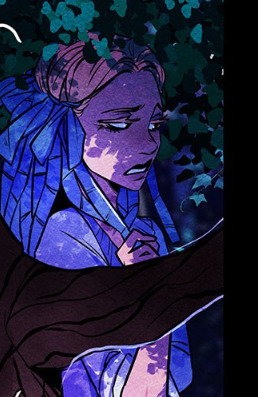
Doesn't.

Sit.
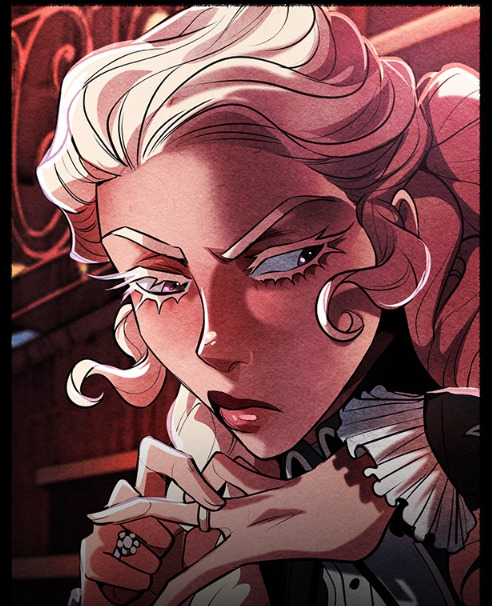
Still.
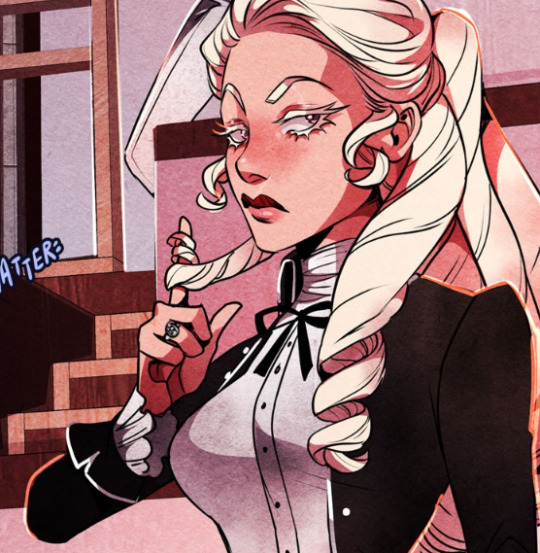
Never.
It is also clear that Annabel is always planning something. Always.
This can be read into the logic of mental hyperactivity: when you have it, your brain just doesn't stop. Ever. And that's something that resonates with this lady.
Emotional Dysregulation
The part of the brain that regulates our moods works…erratically. Not to say it doesn't work at all.
This leads to a painfully common problem in women with ADHD: lack of emotional regulation is seen as drama, and instead of being taught tools to deal with it, we are taught to repress and bottle up emotions.
Annabel has highly internalized this as a defense mechanism. But here's the thing: if repressing emotions instead of learning how to deal with them in a healthy way is harmful, being biologically unable to regulate them can be even worse.
It touches the right nerves, and if you catch us flying low, it can cause explosive outbursts.
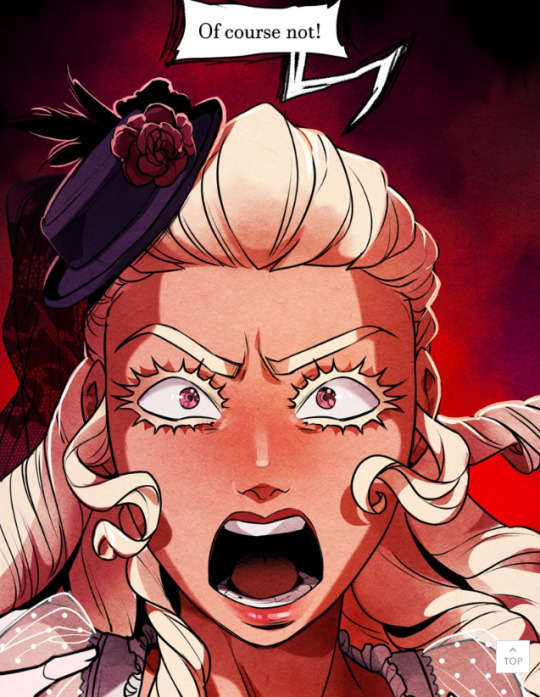
Possibly violent reactions to feeling offended or uncomfortable.
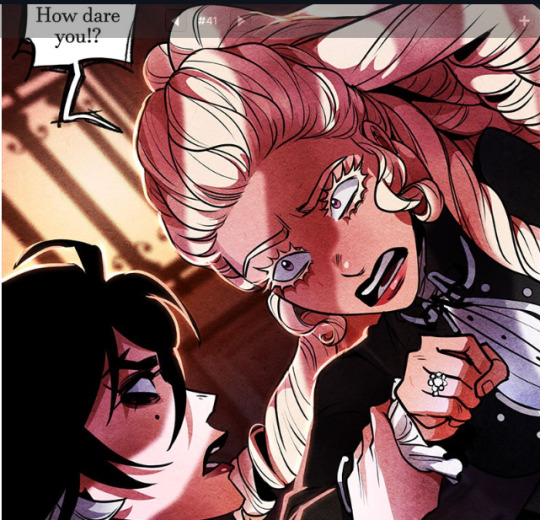
Or completely over-the-top reactions that we can't control.
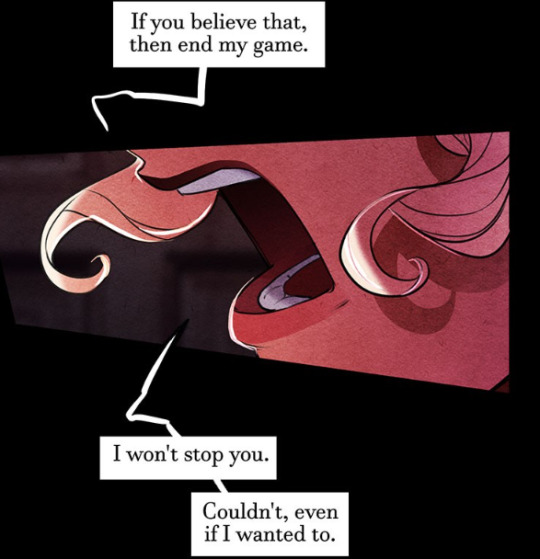
And it's not just anger that's affected, it's the whole emotional spectrum. Another emotion that is very noticeable is fear. If we don't develop tools to help us calm down, we don't get scared, we panic.
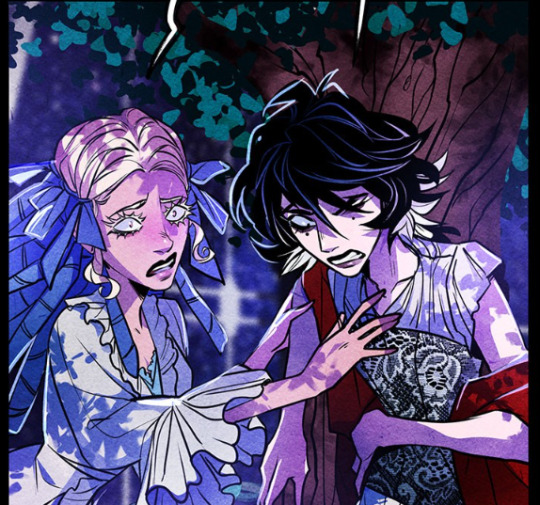
If this happens too often, we can become prone to developing severe anxiety or frequent attacks.

We may also have great difficulty dealing with frustration. Our brains love rewards, and feeling that we're not getting them because of our own inability to do something can be downright annoying. And if we don't have the tools to express our frustration appropriately, we can have quite childish reactions, ranging from temper tantrums to…pouting.
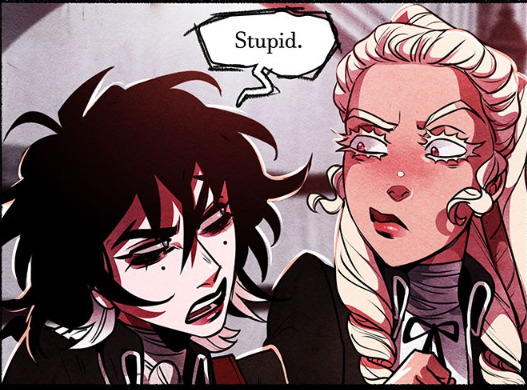
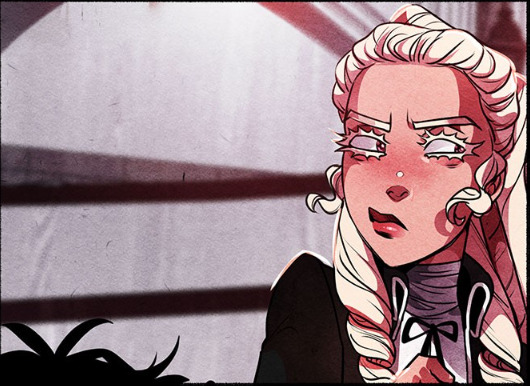
I find it funny how several of these pouts are caused by Lenore, a bit like "Oh, come on, honey, what are we talking about?"
Another important thing to note here is that one of the most fucked up and notorious symptoms of this lack of emotional regulation is RSD, short for Rejection Sensitive Dysphoria, defined as "a problem that interferes with your ability to regulate your emotional responses to feelings of failure and rejection. While rejection is almost always unpleasant, people with RSD experience overwhelming levels of emotional pain. This can lead to long-term mental health problems, fear of failure, and behavioral changes that negatively affect them throughout their lives."
Rejection and fear of failure are a problem for us. So much so that we may seek strategies to avoid it as much as possible, even when it causes us problems (such as not completing a task for fear of doing it wrong). This is an issue that can tear us apart emotionally.
Annabel is terrified of being rejected or despised. Her whole life has been built around appearances and getting the right people interested in her. If she can't do that, what good is she?
And that's something that comes up a lot in her relationship with Lenore. Repeatedly, in fact, but my favorite has to be this one:
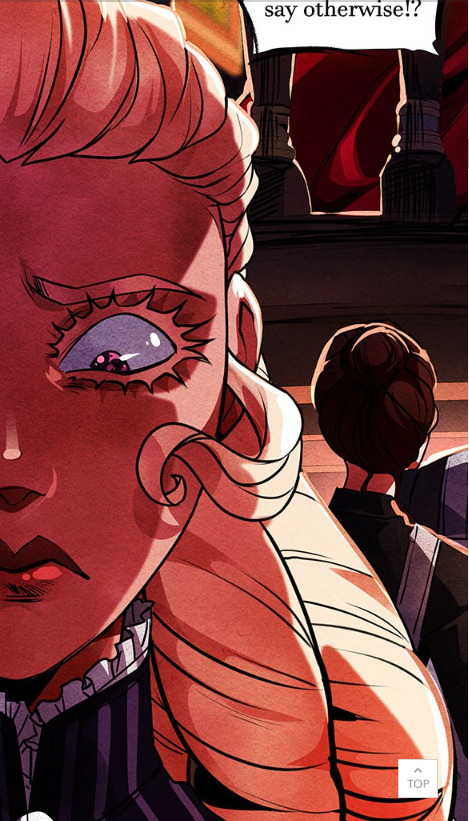
Annabel thought it would be the smart thing to do to break that bond because she knows they're never going to see each other again. But the look on her face when Lenore calls her a "damn liar" is just painful to watch. I think ripping her heart out with a rusty spoon would have hurt less.
Finally, on the subject of things that aren't so funny: that thing Annabel does about biting her fingers when she's in a critical situation is something I used to do, too (only I'd bite my knuckles or palms).

My psychologist explained to me that when you feel like you're losing control, you immediately look for something to ground you, and unfortunately, physical pain is often a quick (if damaging) way to do that.
Codependency
Okay, here's a thing: it's not that we have a tendency as such to codependency, but this is a situation that can occur due to bad practices within a relationship. Especially a couple one.
As it stands out, people with ADHD can have a lot of problems with micromanaging ourselves, remembering things, dealing with our emotions, etc, etc, etc. And it is natural for close friends, family or our partner to help in those processes.
The problem arises when that help starts to become a parentification process where the partner who is providing support starts to do this on behalf of the other person, infantilizing them in the process.
This is a cocktail for resentment on both sides: the party calling the shots can easily feel that the other is putting a huge burden on their shoulders and not trying hard enough, while, on the other side, no one likes to feel like they are being treated like a child. Let alone that the person doing it is your partner.
But at the other end of resentment, there's codependency.
The constant feeling that you are a burden, insufficient or even disposable.
And that means you have a lot to make up for. On a regular basis. So much that you put yourself in a situation where you have to make horrible decisions so that someone else doesn't have to because somehow you owe it to them, who hasn't had that happen?

What I mean is that yes, Annabel feels like she owes this to Lenore because she only remembers the part where Lenore came kicking in doors to save her from a marriage she didn't want. And if she can't do this for her, she doesn't deserve a relationship.
Feeling inadequate, that your partner is doing you some kind of favor by tolerating you and ending up idealizing their in the process is obviously not unique to the neurodivergent experience.
But we try, we try really hard and, like anyone else, we like to feel that the effort we put in is seen and valued.
If we are not careful about that, we do indeed fall into the risk of becoming codependent. The desire to feel loved or valued becomes a constant hunger for validation from which it is difficult to escape because we are aware that our brain will never function in a different way. And if that is mixed with RSD, it can become an even bigger problem.
Novelty, games, challenges, and rewards
Producing dopamine on a normal basis is one thing our brains aren't very good at (one of the reasons we can be prone to depression, for example), but you know what they love? Challenges and rewards.
New things feed our endless curiosity, but for some reason unknown to me, our brains really love challenges and dares. They give us dopamine like we're on a high.
So much so that some people use it as a tactic to perform tasks they don't like: "How many dishes can I wash before my dinner is ready?", "If I can finish this in less than 30 minutes, I can go get chocolate."

One medium we may like very much for this reason is games. Board games, card games, or virtual games. It doesn't matter. Games provide a very good balance of challenge and reward.
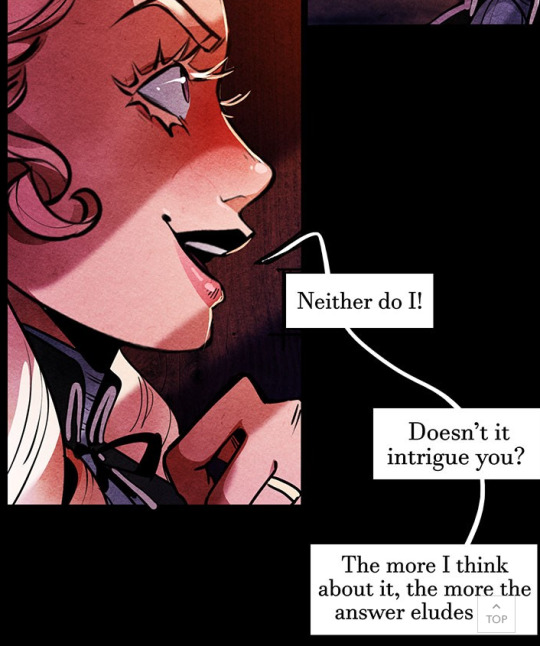
If you see that Annabel seems overly interested in how this works, it's because there may be a part of her that thinks "aside from the deadly situation we're in…this is like the most hardcore escape room ever" and inevitably there's something here that stirs her bug.
It may be something she loves about Lenore. As a good hypocrite, Annabel despises the rules she knows so well, so when Lenore comes along with this gimmick and completely changes the paradigm of what she knows, there is inevitably something that appeals to her. Others who are good at the game look down on Lenore's disdain for the rules, to Annabel it is fucking appealing because it offers a range of unexplored possibilities that she fucking loves.
Erratic Communication
When our brains are running at full speed, communication can become a challenge, and we tend to exhibit erratic patterns.
One of these is info-dumping. Touch a topic we know about or are interested in and it's like stepping on a landmine: we explode talking about it. Non-stop. You'll have to hit us to shut us up.

Another thing is that we can have a bad habit of interrupting. A lot. It's not malicious, it's just that we're really into the conversation and want to participate as much as possible.
That said, even if we're extroverts, it can be a nightmare to withhold information or participate in a conversation if it doesn't grab our attention. It's not that we want to be disrespectful or anything, it's just that, again, we have no control over our ability to pay attention and we're swimming against the tide to hold on to whatever it is you're telling us.
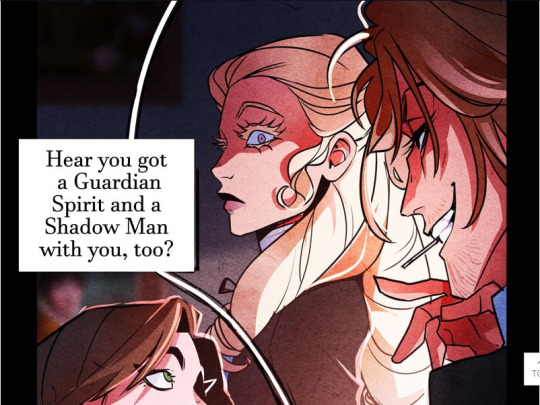
This scene is something I've seen in friends with ADHD and have been told I do: stare at people while doing your best to do the hamster run to remember what they're telling you because you know it's important, even though your brain is putting it together with junk information because it's not engaging your attention in the right way.
Ignore the murderous stare part, it's not that common - at least I hope not.
Drinks that are like a pill
Our brains are not designed to produce certain hormones naturally or, in some cases, they produce them under other circumstances. For things like that, we can take pills, develop strategies to help our brains produce hormones.
And drink coffee. Lots of coffee.
Caffeine can be extremely relaxing for us because it can actually help our brains keep functioning, you know that stereotype of the highly coded ADHD character who drinks coffee like it's his life? Well, that's because.

You know what other beverage has a similar effect? Tea. Theine is also a natural activator, perhaps less aggressive than coffee, but it can have a similar effect.
If you're interested in describing this topic in fanfic or touching on it in fanart, tea should have a relaxing effect on Annabel and even help her concentrate.
Boredom
We get bored. A lot. And we get painfully bored. Here's what happens: boredom is caused by a lack of stimulation, and our brains aren't stimulated just because we can't regulate our attention to seek out that stimulation.
Add to that the fact that when we are bored, without dopamine hitting our receptors, our executive functions diminish and we function like shit.

Boredom
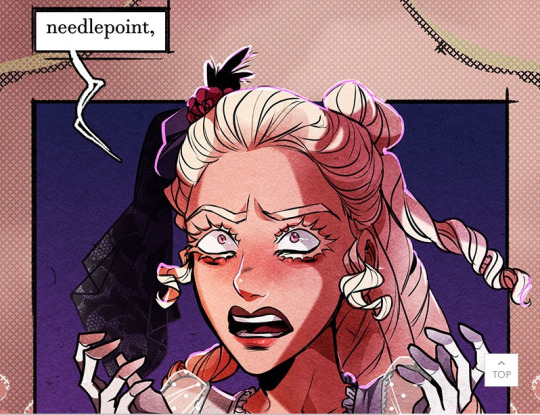
Is
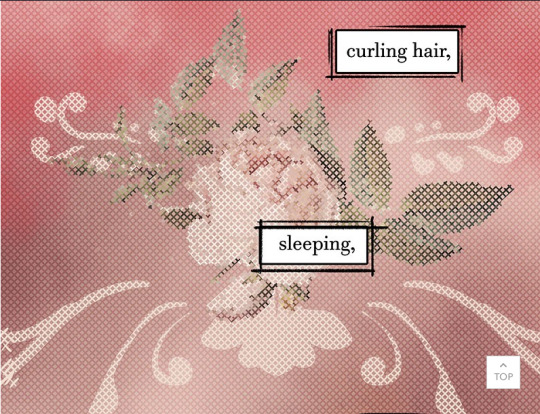
Fucking
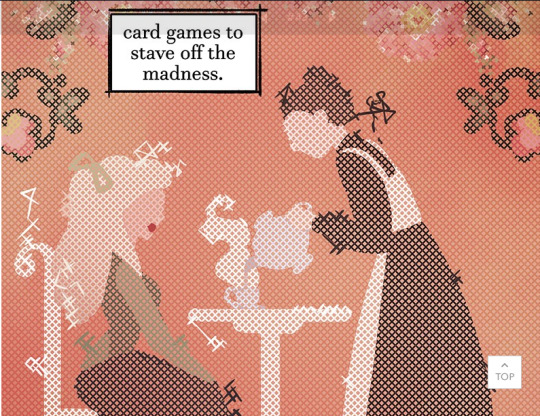
Murder
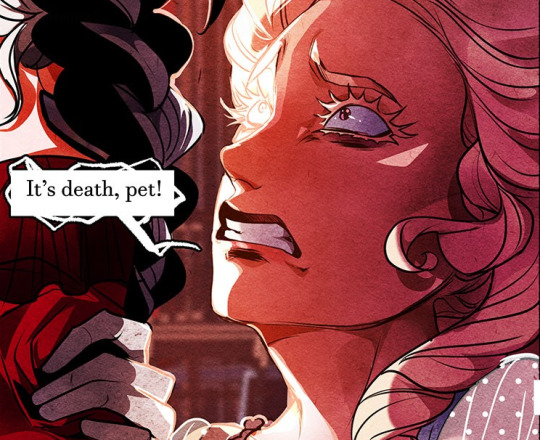
Because our brain starts desperately asking for dopamine and we can fall into really unhealthy behaviors like fighting, being chronically online, or eating because we can't find anything better to do. This also contributes -again- to our depression or anxiety.
Conclusions (and if I don't make the joke, I'll die)
In the book ADHD After Dark (a study of ADHD, relationships, and physical intimacy), Ari Tuckman draws some interesting conclusions, one of which is that on a statistical level, people with ADHD seem to be more likely to have what he calls "sexual eagerness": kinks, fetishes, a tendency to be adventurous in bed, and the like. Again, our brains love play, and both intimacy and flirtation can involve a lot of it.
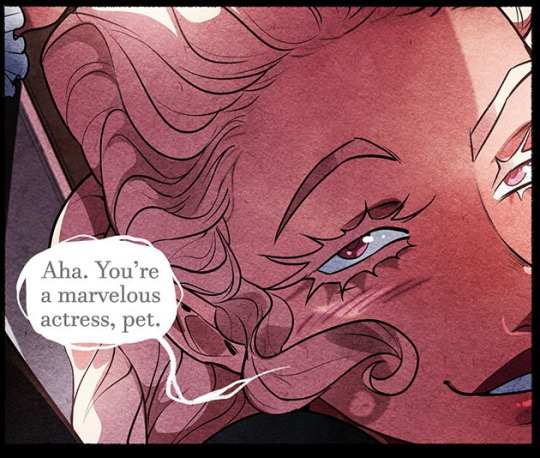
So…

Um…
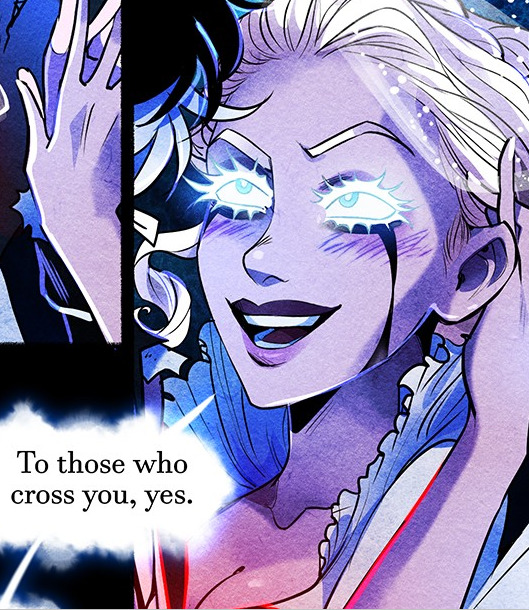
…well, I think Lenore will be happy. Good for her.
Anyway, this has been a seriously long explanation. Thanks for reading this far.
#nevermore webtoon#annabel lee nevermore#lenore nevermore#white raven#annabel lee whitlock#lenore vandernacht#annabel lee x lenore#lennabel#nevermore webcomic
236 notes
·
View notes
Text
I don’t know if anyone else has ever noticed but Jack and Sally both are great representation of characters with Hyperactive ADHD Inattentive ADHD.
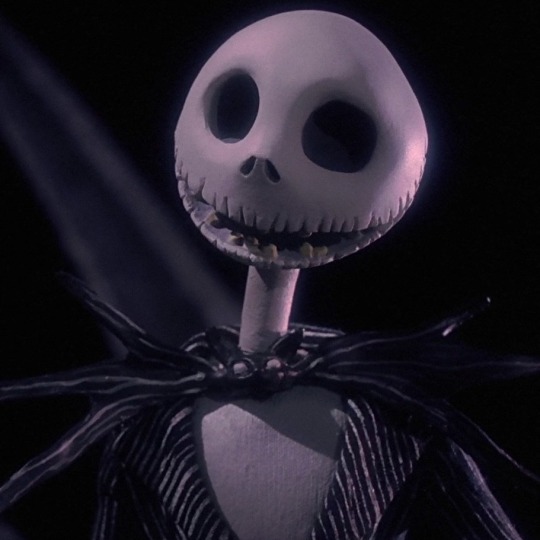
Jack very much displays signs of Hyperactive ADHD. From being impulsive to getting obsessed with something and forgetting everything else. Hyperactive ADHD tends to only affect people born male and gets most attention because they are usually extrovert and can’t sit still Jack has all of these.
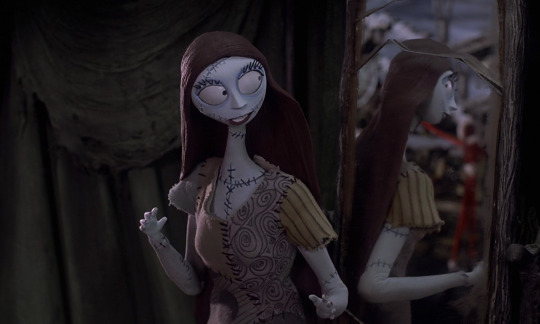
Sally very much as well shows signs of Inattentive ADHD Sally gets lost in her thoughts and has a very hard time connecting with others. Inattentive ADHA tends to affect people born female. This type of ADHD is very much more internal where it can be more hard to diagnosed. Sally tends to keep to herself even when she’s in a group setting.

At the end though Jack and Sally find each other and love each other through and through.
#disney#the nightmare before christmas#sally the nightmare before christmas#tnbc sally#jack and sally#sally skellington#jack skellington#sally and jack#jack the nightmare before christmas#adhd#adult adhd#adhd inattentive#inattentive adhd#adhd hyperfixation#hyperfixation#hyperactive#adhd hyperactive
50 notes
·
View notes